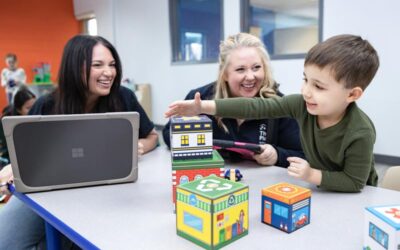With a growing movement towards autism awareness and acceptance, an increasing number of businesses and people are offering their events and services with “sensory-friendly” accommodations. But what does “sensory-friendly” mean for children with autism?
Individuals on the autism spectrum process sensory information differently than their neurotypical peers. Sometimes this means that people on the spectrum take in more of that information and can become overwhelmed, especially in public settings. Sensory-friendly or autism-friendly environments are designed to account for sensitivities linked to autism. Any sensory-friendly event or space should allow individuals on the spectrum to comfortably partake in the same activities as their neurotypical peers.
Just remember, if something is advertised as a sensory- or autism-friendly event, you should do your best to check what accommodations are offered, and that they fit you or your child’s specific needs.
What Makes an Event Sensory-Friendly?
Multiple factors go into making sure an event, activity, or environment is sensory-friendly, including appropriately trained staff and environmental considerations.
Autism-Friendly Staff
When an event is autism friendly, or specifically tailored for individuals on the spectrum, they are likely to have staff present with special training or knowledge on the accommodations. For example, they may know that:
- Some individuals on the spectrum are uncomfortable making eye contact.
- Body language, facial expressions and gestures can be misinterpreted or altogether missed by people on the spectrum, so being direct is a more efficient way of communicating.
- Popular phrases and sayings may be taken literally.
- If the person has limited speech ability, adapt with sign language or symbols.
- Transparency about the order of things and the plan can make attendees feel more comfortable.
For an event to truly be autism or sensory friendly, there should be some personnel present that are aware of best practices for communication and social interaction for people on the spectrum. If you’re unsure that there is, make sure you ask!
Environmental Factors
Sensory-friendly spaces take into account the environmental factors that can contribute to a sensory overload. All the senses should be considered.
- Sight – Having a space with serenity in mind, that doesn’t expose attendees to sudden changes in light. The space focuses on moderation, and calming color schemes.
- Touch – Some events will have specific sensory objects and toys designed to stimulate attendees’ sense of touch, and provide a way for people to keep their hands busy.
- Taste – Events with food have detailed descriptions of ingredients and taste, and several options.
- Hearing – Attendees aren’t exposed to loud and sudden noises, and the general volume never gets too high or low.
- Smell – The space is not heavily scented with air fresheners, and mixed odors are kept at a minimum.
In general, the environment of a sensory-friendly event is moderate and structured. Any business that advertises sensory-friendly events should be able to tell you what makes their space and staff equipped to accommodate people with autism. Don’t be afraid to ask what accommodations qualify an event as sensory-friendly.
If you’re looking for sensory friendly events near you, be sure to keep up with our events calendar or follow us on Facebook and Instagram for the latest.



